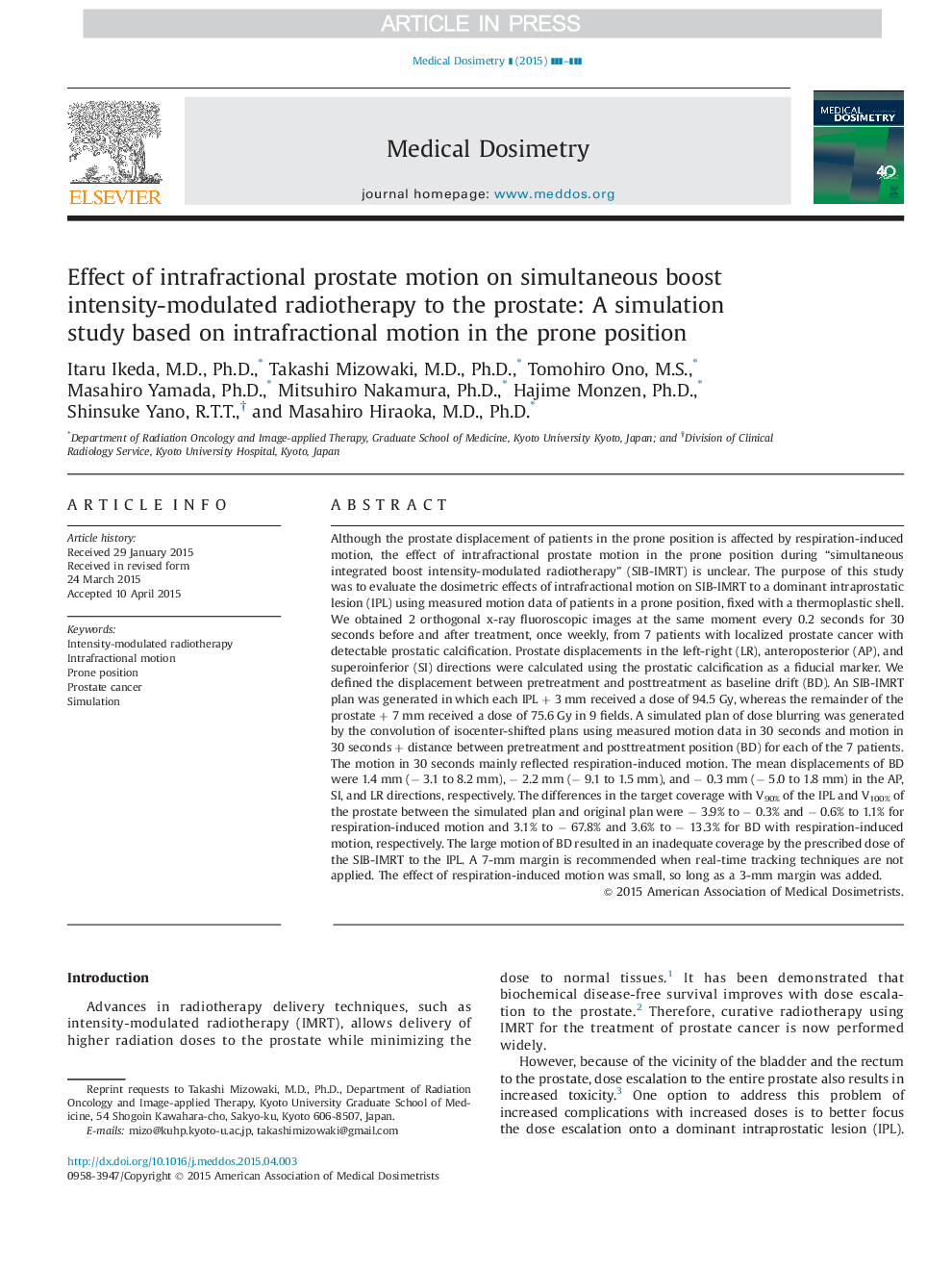| کد مقاله | کد نشریه | سال انتشار | مقاله انگلیسی | نسخه تمام متن |
|---|---|---|---|---|
| 1884874 | 1533330 | 2015 | 8 صفحه PDF | دانلود رایگان |
عنوان انگلیسی مقاله ISI
Effect of intrafractional prostate motion on simultaneous boost intensity-modulated radiotherapy to the prostate: A simulation study based on intrafractional motion in the prone position
ترجمه فارسی عنوان
اثر حرکت پروستات بین فسفاته بر روی پرتودرمانی مدولاسیون شده با شدت همزمان به پروستات: یک مطالعه شبیه سازی بر اساس حرکت بین فسفر در موقعیت پایینی
دانلود مقاله + سفارش ترجمه
دانلود مقاله ISI انگلیسی
رایگان برای ایرانیان
کلمات کلیدی
پرتودرمانی مدولاسیون شدت، حرکت درون فرکانس، موقعیت پیشانی، سرطان پروستات، شبیه سازی،
موضوعات مرتبط
مهندسی و علوم پایه
فیزیک و نجوم
تشعشع
چکیده انگلیسی
Although the prostate displacement of patients in the prone position is affected by respiration-induced motion, the effect of intrafractional prostate motion in the prone position during “simultaneous integrated boost intensity-modulated radiotherapy” (SIB-IMRT) is unclear. The purpose of this study was to evaluate the dosimetric effects of intrafractional motion on SIB-IMRT to a dominant intraprostatic lesion (IPL) using measured motion data of patients in a prone position, fixed with a thermoplastic shell. We obtained 2 orthogonal x-ray fluoroscopic images at the same moment every 0.2 seconds for 30 seconds before and after treatment, once weekly, from 7 patients with localized prostate cancer with detectable prostatic calcification. Prostate displacements in the left-right (LR), anteroposterior (AP), and superoinferior (SI) directions were calculated using the prostatic calcification as a fiducial marker. We defined the displacement between pretreatment and posttreatment as baseline drift (BD). An SIB-IMRT plan was generated in which each IPL + 3Â mm received a dose of 94.5Â Gy, whereas the remainder of the prostate + 7Â mm received a dose of 75.6Â Gy in 9 fields. A simulated plan of dose blurring was generated by the convolution of isocenter-shifted plans using measured motion data in 30 seconds and motion in 30 seconds + distance between pretreatment and posttreatment position (BD) for each of the 7 patients. The motion in 30 seconds mainly reflected respiration-induced motion. The mean displacements of BD were 1.4Â mm (â 3.1 to 8.2Â mm), â 2.2Â mm (â 9.1 to 1.5Â mm), and â 0.3Â mm (â 5.0 to 1.8Â mm) in the AP, SI, and LR directions, respectively. The differences in the target coverage with V90% of the IPL and V100% of the prostate between the simulated plan and original plan were â 3.9% to â 0.3% and â 0.6% to 1.1% for respiration-induced motion and 3.1% to â 67.8% and 3.6% to â 13.3% for BD with respiration-induced motion, respectively. The large motion of BD resulted in an inadequate coverage by the prescribed dose of the SIB-IMRT to the IPL. A 7-mm margin is recommended when real-time tracking techniques are not applied. The effect of respiration-induced motion was small, so long as a 3-mm margin was added.
ناشر
Database: Elsevier - ScienceDirect (ساینس دایرکت)
Journal: Medical Dosimetry - Volume 40, Issue 4, Winter 2015, Pages 325-332
Journal: Medical Dosimetry - Volume 40, Issue 4, Winter 2015, Pages 325-332
نویسندگان
Itaru M.D., Ph.D., Takashi M.D., Ph.D., Tomohiro M.S., Masahiro Ph.D., Mitsuhiro Ph.D., Hajime Ph.D., Shinsuke R.T.T., Masahiro M.D., Ph.D.,
